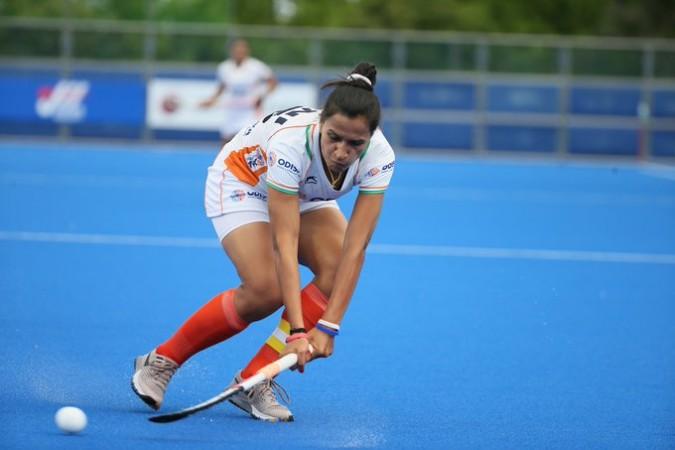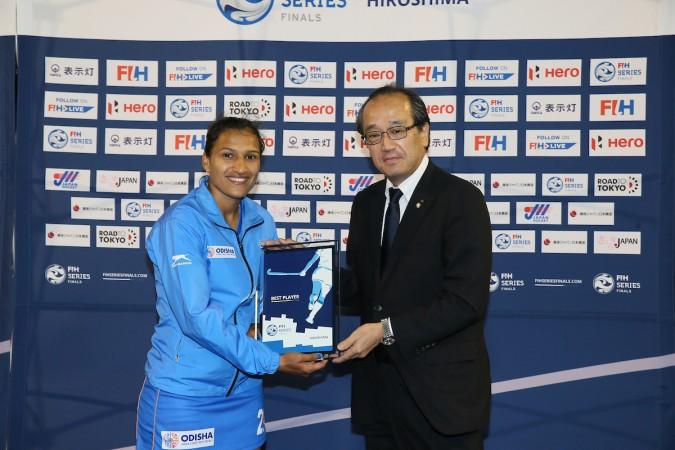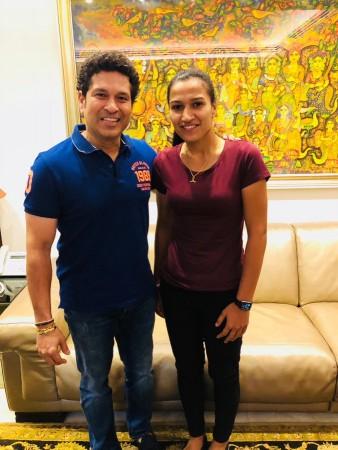
After the heady days of 2002 Commonwealth Games gold which inspired the movie Chak De India!, Indian women's hockey team slipped out of the public view. But a quiet revival has been underway since 2016. The lady at the helm, Rani, believes even better days await her side.
The 24-year old, who made her debut at the precocious age of 14, has a side throbbing with young talent and bustling with youthful energy. In this exclusive conversation with Akshay Saraswat of International Business Times, India, the 'queen' of Indian hockey discusses the growth of her team, crushing disappointments last year and the will to move forward without fear. She has also got some valuable inputs from a man who knows all about reaching the apex of sporting success - Sachin Tendulkar.
You are just 24 years old but have been in international hockey for a very long time. Have you started feeling like a veteran or still regard yourself as a youngster?
Rani: I know that I have been playing in the senior team for a very long time. There are a lot of new, younger players in the side now as well. So, I do feel like a senior player. I feel greater responsibility on myself and also realize that I need to take youngsters along. But in my mind, I know that I can do a lot more.
While most of the players in your team are young, a couple are senior than you. When you took over the captaincy, how was your relationship with them?
Rani: I have also played under many captains, including my batch-mates. Right now, while I am the captain, Savita (team's goalkeeper) is senior to me. They (seniors) co-operate with me very well. At no time does the thought that 'she is the captain despite being our junior' enter their mind. Secondly, they also believe that the deserving person should get their rewards.
With captaincy, how can you best handle the side is something one learns with experience. But certain players naturally possess that quality. Some players don't have that quality even after playing for a long time. So, it's not something about which they feel bad.

Normally, captains in hockey tend to be mid-fielders and control the game from that position. You are a forward. How tough it is to control the game while being an attacker?
Rani: You see, when we are playing, it's not as if I am the only captain on field. While the match is on, everyone is a captain in her own right. Every player knows what her responsibility is. "What is my role and what do I need to do?" Everyone knows the answer.
Everyone has to guide in their own lines – goalkeepers have to guide the defenders. Defenders have to guide the mid-fielders. They, in turn, have to guide the attackers. So, it's not as if I am the only one who tells players what to do and what not to do in the match.
There are many experienced players who play with us. They have been playing for a long time so they also behave like senior players in understanding their responsibility and maintaining the structure of the team. It's not as if I control the whole team while playing forward. Everyone controls their line so that our game works well.
One of the most important members of your team is striker Lalremsiami. Because of her lack of knowledge of Hindi and English, is it difficult to communicate with her?
Rani: It used to be very hard for her to work with us since she knew neither Hindi nor English when she was new in the team. But Hockey, like other sports, has a common language. We can understand her through signs.
But if we have to say something to her or explain something, that is difficult. But she has done a lot of hard work on her own to improve herself and her language. Of course, all of us also help her a lot. We talk to her in an easy way so that she could understand words. She also reads a lot of books and does other things to improve her language skills. Lalremsiami now speaks such good Hindi that we cannot believe it.

You met Sachin Tendulkar some time ago. There is one great similarity between you two. While he made his debut at 16 years of age, you did so at 14. So, what was the conversation like? Was it mainly about sports?
Rani: Yes, it was mainly about sports. I and one colleague of mine had gone to meet him. He talked to us in a very motivating way. He told us about his career and how he dealt with various things related to a team sports.
He also told us how he handled criticism when people would say uncharitable things about him. Also, when we are playing well, how to act as a team? We learned a lot of things. He was such a good player of his time.
Sachin played in 6 World Cups including two World Cup finals. You have and will play more World Cups. So, did he give you some advice on how to deal with the challenge of playing in big tournaments?
Rani: Yes he told us that when we do well, people's expectations from us also become greater. But we should try to do what is our best. If we think too much about what people think, we would be putting more pressure on ourselves.
We would start thinking "What will people say? Will we be able to perform?" That pressure is always there but we have to remain cool and calm and focus only on our performance. This attitude, ultimately, reduces the pressure. If we pay too much attention to other things, the focus on our performance gets reduced. Then, people start saying all those things that they shouldn't.
So, that's what he told us, that in big tournaments, we should remain cool and calm. Because very few players get the chance to represent their country. If we have got that opportunity, we should play while remaining cool, focus only on our performance and the training that we have done.

Last year, your team lost in the quarterfinal of the World Cup to Ireland, an unfancied side that eventually reached the final. Then came the disappointment of losing to Japan in the Asian Games final. How hard was it to get over these disappointments?
Rani: It was very difficult. Especially the World Cup loss was very hard to recover from because we knew we could win against Ireland and the game went to a shootout. Penalty shootouts can go either way. But still, we think we didn't play well that day.
That period (after the match) was very difficult. Seriously, our entire team was so disappointed that we felt that everything is finished for us. Only two weeks after that, we had the Asian Games. So, it was very difficult to figure out how we would get out of that disappointment because we had worked very hard to prepare for that tournament. There was a very good chance of us going through to the World Cup final. So, all of us were crying a lot after that.
"What have we done? We could have played better" were the thoughts going through our minds. But after that, we decided that, no worries, we have lost in one tournament but we cannot waste the next one – Asian Games.
Earlier in the year, we had also lost to Australia in the Commonwealth Games semi-final 1-0. That was also a very close game. So, our intention was to do well in the Asian Games, win it so that we can directly qualify for the Olympics. But the same thing happened in the Asian Games. We lost to Japan 2-1 in the final.
That was especially a great disappointment for me and Savita as we had been putting in a great deal of effort over the years to get this kind of an opportunity – of playing a World Cup final or winning an Asian Games gold. Yes, it was very difficult because we felt like "Why are we playing this game? What are we training so much for?"
Did anyone try to motivate you at that time, to revive your spirits?
Rani: Yes, when the debacle in the World Cup took place, our support staff provided great moral support. They also gave us a day off and said, "Do whatever you want. If anyone wants to stay in their room, they can do so. If someone wants to go out, do so. Take your time to get out of the depressed mood. This is not the end of the world. This is not the end of your life. There are other things ahead of you as well. You need to focus on that. If you lose heart completely, you can't perform well in the Asian Games."

Seriously, our support staff helped us a lot in recovering mentally from the disappointment. After the Asian Games also, we said that "what has passed cannot be brought back." Right now, our focus is entirely on the Olympic qualifiers. We want to qualify so that we can perform well in the Olympics.
What do you think about the support for your team from the general public? Is it good or lacking?
Rani: Compared to before, there has been a great deal of improvement. A lot of people on social media are following women's hockey and are watching women's hockey. But still, I think more awareness should be there as well as more interest. Hockey is our national sport and we should follow this game. On the other hand, we also feel that we should always give our best so that we don't let down all our well-wishers and hockey-lovers. But it is sports and you can't win every time. Especially when we lose, that's the time we need the support of the people most.
Coach Sjoerd Marijne has been with the team for a long time. Have you and your team developed a good chemistry with him? Secondly, he was made the coach of the men's team in 2017 before returning to the women's team. Do you think his being away from the team for that period proved detrimental?
Yes, he was with us in 2017 and did some great work. Then Harender Singh became the coach and he also did really good work. Then Sjoerd Marijne returned. So, both coaches have done great work for the improvement of the team.
I think since the 2016 Olympics, in the last three years, the improvement in women's hockey has been unbelievable. We have progressed continuously. I wish we continue to do the same in the future. Both coaches have done a lot of hard work.

Especially, the support staff has done really well. Our trainer Wayne Lombard has put in a lot of work on team's fitness in the last two years. If you look at it, on one level, we are not behind any team in terms of fitness. It's highly creditable that he (Lombard) has affected the team in this way. Of course, the players have also worked hard but he has a very big role as he has worked a lot on individuals as well as on the team as a whole, identifying the strengths and weaknesses of different players.
With there being no off-side rule in hockey now, most centre-forwards like to take their place in the 'D' in front of the goal so that they can deflect the ball if it comes to them. Do you like to play that role or do enjoy dribbling through the defence more?
Rani: No, it's not like that in modern hockey. Centre-forwards don't remain in the D all the time to deflect the ball. Hockey of today has changed a lot. These days, strikers have to come all the way back to help the defenders and then take the ball away to score the goal.
So, it's not like the old times when the forwards can stand in the D and wait for the ball to score the goal. These days, we have to do both things, defending and attacking. Hockey has become so fast that you can't stand still at one place even for a second. You have not time even for thinking or taking a deep breath.
As you go further in your career, would you like to continue as a forward, or move into the mid-field?
Rani: Even now, I am playing in a way that makes me more involved in the mid-field, to control the game. It's always the demand of the team, what our team requires. It's the coach who decides which player plays where and who is needed most in which position. So, it's up to him.














